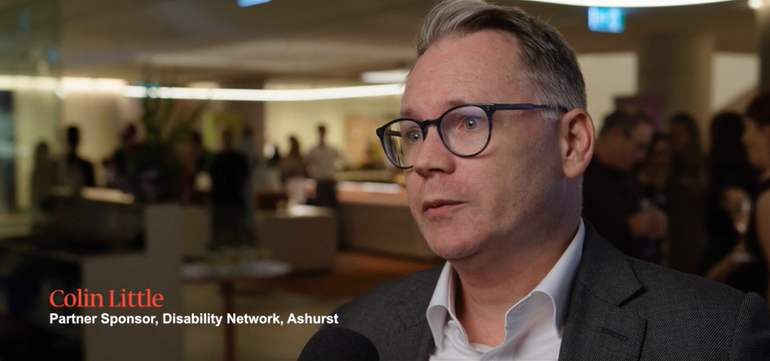Inside ANZ
Celebrate your strength
"One in five people have a visible or invisible disability and we want to enable their social and economic participation, from getting a job, saving for retirement or becoming the next LeBron James.”

Dylan Alcott & Shayne Elliott
ANZ has always been a progressive organisation that understands the benefits of diversity; we were the first bank to employ women in the 1880s. Being the most international of Australia’s banks, diversity has been ingrained in our culture from the outset.
Eight years ago, when I became CEO,we were the first major organisation to partner with Dylan Alcott during the early stages of his tennis career.
The marketing team approached me with the idea of sponsoring Dylan – whom I did not know. But when I first saw him at a client event, the response to him was magnetic. I remember saying to the marketing team: “This guy is magic. People see him at his heart.”
Fast forward eight years and I am proud to say supporting diversity has proven better for the bottom line of both our employees and customers. It has become a core pillar of who we are as a bank.
Diverse products and spaces benefit everyone
One in five people have a visible or invisible disability and we want to enable their social and economic participation, from getting a job, saving for retirement or becoming the next LeBron James. Communities thrive when people can be themselves.
We must ensure our products and services facilitate equal opportunities for everyone. Based on my experience, for meaningful change to occur, organisations must integrate social impact initiatives into their core identity. Merely relegating social impact work to the sidelines would not make sense for a company like ANZ.
At ANZ, we still have a long way to go. But I believe we have made meaningful change over time.
The common misconception that people with a disability “can’t” means they can be left out of the economic equation.
“There's 4.5 million people in this country with a disability, only 54 per cent of them are involved in the workforce. That number hasn't changed in 31 years.” Dylan says.
“Don't assume someone can't do it, ask them if they can.”
Dylan reminded me text messages were invented so deaf people could use phones. The same with voice to text.
We must change the narrative that disability is an inconvenience.
Accounting for disabilities “makes you better at business,” Dylan says.
You can have all the ramps in the world but that means nothing if people with a disability arrive to your offices and don’t feel included.
We must take a comprehensive approach. It’s not enough to have a work experience program for people with a disability – we must embed the principles in everything we do.
Community and networking
Dylan had a rough start with his journey. “I’ve had my disability my whole life and although I am the happiest person in the world and the luckiest person in this room, I cannot tell you how much I used to hate myself.”
“I didn't know anyone with a disability until I played my first tennis tournament, the Thurgoona Tennis Open. I saw a guy in a wheelchair who was smiling, and I wasn't. He was driving a car. I didn't know you could do that and I realised - this is my community”, he says.
He didn’t necessarily become a world champion because he loved tennis. That helped of course, but the reason he got out of bed was he’d found his tribe in sport.
Colin Little is a Partner at Ashurst, a sponsor for the firm’s Disability Network and involved in helping advance employment of people with disabilities through the Dylan Alcott Foundation. Colin recently spoke with Dylan and I at an event where he reminded us of the importance of having such networks within organisations.

Colin Little, Partner Sponsor, Disability Network at Ashurst
Colin was born with cerebral palsy, a group of conditions that affect movement and posture. As a junior lawyer, he didn't have role models with disabilities in the profession - this being one of the reasons he sponsors Ashurst’s Disability network.
“Having a disability can be an isolating experience. Sometimes you feel like part of a very small minority, and it's easy to feel that no one is sharing your experience”.
“That network is an important community made up of people with disabilities and our allies. I joined the community because I know firsthand some of the challenges in starting out a career as a lawyer.” Colin says.
“Not only is the physical infrastructure of accessibility important, but the softer side in terms of culture and attitudes to people with disability is just as important”, he adds.
Throughout my career I have seen the huge impact networks can have on individuals and their inclusion. They are important spaces for staff to come together as a community and to share their experiences and challenges. They also help organisations attract talent and improve the experience of staff.
Something Colin said strongly resonated with me: “To anyone in the room that has a disability, no matter what your career or ambitions or aspirations may be, my message is simple: celebrate your strength.”
“Everyone that navigates life and career with a disability does so facing challenges daily and being able to try and creatively find ways to solve those challenges. With that comes resilience, strength and creativity which are a highly valued commodity in any workplace”, he says
At ANZ, our purpose is to shape a world where people and communities thrive, creating opportunities for us to better serve our customers and build inclusive workplaces and thriving careers.
Shayne Elliott is the Chief Executive Officer of ANZ
Related Articles:
Inside ANZ
Leading from the heart
Communities
